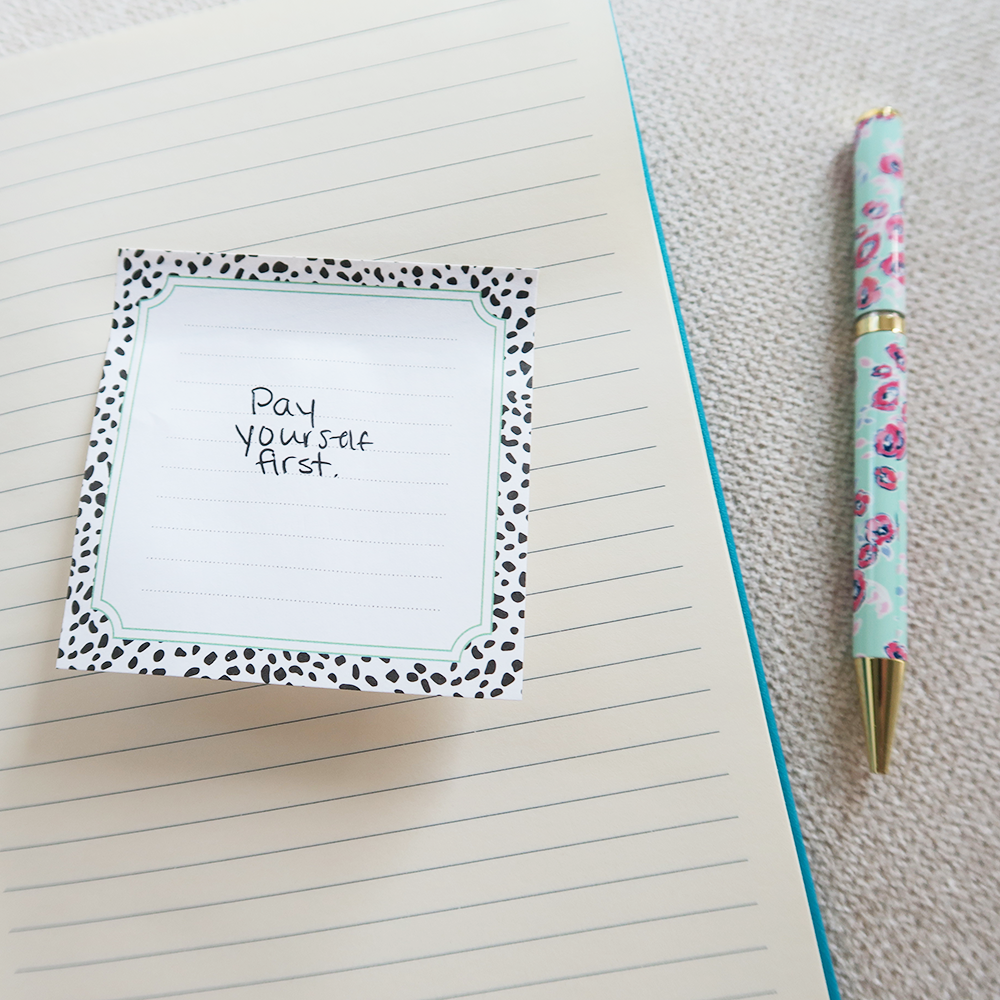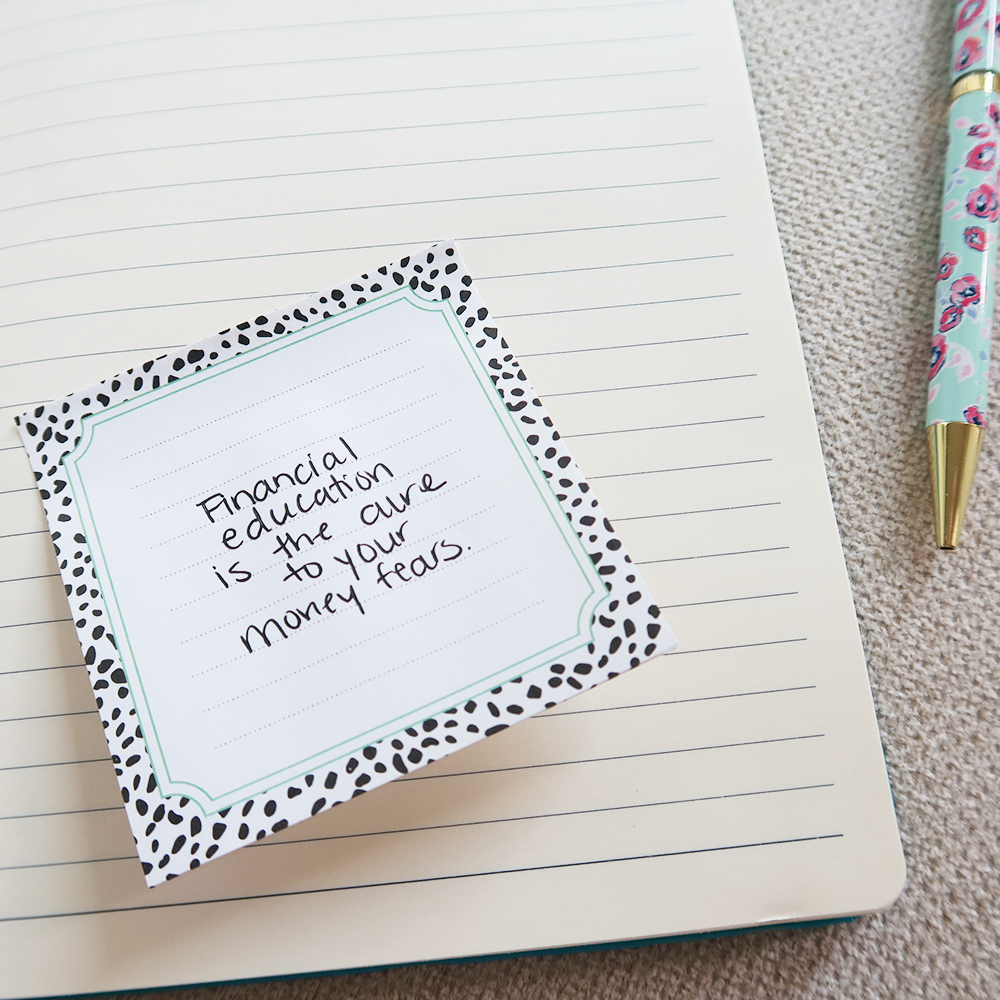This post is sponsored by Lexington Law.

Money can be a challenging topic to talk about. What we learn about money comes mostly from our parents. For better or worse, those financial habits and scripts become ingrained in us. As adults ourselves now, it takes mental effort to change the way we think about, earn, use, and save money.
While your parents are probably giving you good intentioned advice, there are piece of financial wisdom to live by that they may not have covered. These nuggets are tried and true. They are signs that you are cultivating good financial health and a positive relationship with money.
10 Pieces of Financial Wisdom To Live By

1. Don’t spend more than you earn.
This is probably one of the most basic pieces of financial advice you’ll hear over and over again. But for good reason! Spending more than you earn not only can cause you to rack up debt, but it can destroy your credit score. It can also make it difficult to climb out of a financial hole.
People often spend more than they earn because of lifestyle inflation. In other words, you might be trying to keep up with the Joneses. Or more accurately these days — your favorite Instagrammers, bloggers, and YouTubers.
If you’re not living within your means, it’s time to re-evaluate your current budget and spending. The specialists at Lexington Law suggest:
Determine your goals; what do you hope to achieve and by when? Map out the specific steps you’ll take to get there.
The end result of any budget should be living within your means—not spending more than you’re earning. But a good longer-term goal would be to save up to 20 percent of your income each month.
Keep a budget of your cash flow – income and expenses for three months. Are you consistently spending more than you earn? Are you spending close to what you earn? That’s a sign you’re living above your means. Adjust your budget by starting to pay yourself first (piece of wisdom #4).
2. Consider your credit score as a ranking of your financial health.
A low credit score means that lenders see you as more of a risk to lend money to. It also means you might be missing payments to lenders and on your bills. You may also have a high utilization ratio (see what that means and how to calculate it here).
These two things are a sign of poor money management skills. Missing payments and racking up debt are two huge red signs that your spending and lifestyle are out of alignment with your current income, and probably your financial goals too.
If you do check your credit score and are surprised at what you see, it’s a good idea to reach out to someone who specializes in credit repair. Having someone who is knowledgable in the world of credit repair and who will advocate on your behalf is invaluable when it comes to unfair negative items on your credit report. To learn more about credit repair services at Lexington Law, click here.
To begin improving your credit score beyond credit repair, start making your payments on time. Then, begin reducing your utilization ratio by not adding any new balances to open lines of credit. Beyond that, try to make more than the minimum payment when possible. Avoid opening any new lines of credit until your utilization ratio is below 30 percent. You can do it!
3. Acknowledge your financial weaknesses.
Are sales where you’re likely to overspend? Do you buy too many drinks on a night out? Are you spending too much on your rent or car payment? Do you make impulse purchases late at night?
Identifying your financial weaknesses — or to phrase it another way: what triggers you to spend money unnecessarily — can help you make more wise financial choices that are inline with your goals.
Looking at your expenses is a way to begin identifying these triggers. Are you ordering things late at night? Do you spend the most money eating lunch out during the week? Knowing exactly what your weaknesses are can help you build systems to avoid them.

4. Automate your savings.
Pay yourself first.
The very first thing you should be doing when you get paid is transferring a set amount to your savings. Whether this is a personal savings account with your bank or an investment account, pay yourself first.
Before that even happens, though, you should be making contributions to your 401(k) through work or your Roth IRA. Retirement savings are important for us twenty-somethings to look out for ourselves in the future. We can’t predict what retirement will look like for us, but having a nest egg to see us through our golden years is one smart financial move.
Figure out what retirement savings accounts are best for you — and then pay yourself first.
Set up your savings to be automated. As an example – say you get paid on the 1st and 15th of the month. Go through the automatic transfer process at your bank and set up recurring transfers to your savings accounts for the 3rd and 17th. This gives enough time to make sure your paycheck is deposited and any pending payments have gone out.
Make sure to determine how you will allocate your savings. Say you want to add $500 to your savings accounts every month in addition to your retirement savings. You might do something like: Transfer $200 to your house down payment fund. Move $100 to your travel fund. Transfer $50 to your fun fund. Transfer $150 to your long-term savings or investment accounts.
Setting these transfers up to go automatically means you don’t even have to think about saving — it’s all done automatically for you! Then, the rest of your money is yours to spend on your fixed and variable expenses. The best way to save is the automated way.
[Tweet “10 Pieces of Financial Wisdom To Live By”]
5. Don’t buy something unless it makes sense to do so.
We can thank my father-in-law for this nugget of financial wisdom. I’m not sure he meant to really pass this along to me, but it’s something that has stuck with me for years now.
Here’s an example from my personal life: My husband and I don’t own a car. Every year we go back and forth on whether or not having a car will enhance our lives and make things simpler. We primarily rely on on-demand car services, car-sharing apps, and our own two feet to get us around. Buying a car would not only be an upfront payment, a car payment, insurance, parking, gas, and car maintenance.
Sure, having our own vehicle means we could come and go as we please. We could make last minute trips instead of having to reserve a car days, or even weeks, ahead of time. We could not share with other people. All of that sounds really nice, to be honest.
However, there are a few downsides as well. Primarily: the costs associated with a car. Something goes wrong? We have to pay to fix it. In six years of being carless, we have spent less on transportation than we would have simply to own a vehicle for one year. All of this means we can save more money for our financial goals.
Now, this is a pretty big expense to use as an example. However, this logic can be applied to anything! Does it make sense to buy something you weren’t considering purchasing just because it’s on sale? Does it makes sense to order take-out again when you have leftovers in your fridge?
No matter how attractive something might seem, it doesn’t make sense if it’s not in-line with your financial goals. Try asking yourself if it makes sense to buy what you’re about to checkout with. Will life go on if you don’t buy this now? I’ve found that it does.

6. Keep your fixed expenses as low as possible.
Next to your income, the thing that rules your budget the most is fixed expenses. These are the bills and costs you must pay every month. If you’re not paying them, chances are you have low credit and poor financial health. Bills are not optional. You are obligated to pay for the goods and services that you consume and sign up for.
According to the 50/30/20 rule, your fixed expenses should be no more than 50 percent of your take-home income. And I agree. That said, I also think that the fixed expenses should aim for are around 30 percent of your take-home income.
This isn’t always possible given the cost of living, however, I don’t think that should stop you from getting them down as low as possible. Once you have a handle on how much of your take-home income is going to your fixed expenses, it’s time to trim the fat and reduce expenses as much as possible.
As an example, the specialists at Lexington Law suggest:
Examining your spending habits is likely to raise some red flags. Do I really spend $1,200 a year on cable? I spent way too much on shopping and dining out last month. I can’t believe my electric bills are so high! –These are just a few of the thoughts that may be swirling in your head…. Consider cutting back monthly expenses and putting your resources to better use. For example, reduce your $100 cable bill to $7.99 by switching to Netflix. Use the $92.00 in savings to pay off credit card debt and reduce your credit utilization ratio. Whatever your strategy, embrace actions that will support both financial health and positive credit repair. Focus on financial health by reducing the bottom line.
Reducing your fixed expenses means you can add more money each month to savings. Maybe you can actually go on that trip to Europe that you have been dreaming about for years. You can save for a new computer. Or you can pay off your student loans or mortgage faster.
7. If you don’t have the cash to buy it, you can’t afford it.
This applies to anything you might be considering putting on a credit card. You might use a credit card to earn points for cash back or travel rewards, but as a rule of thumb, don’t charge something to a credit card that you don’t have the cash to pay for.
A credit card is not cash. It is not free money. A credit card is a tool to help you build your credit. Utilizing them properly can be the difference between excellent credit and a deteriorating financial situation. If you have found yourself in a tough spot, reaching out to credit repair specialists is one of the smartest moves you can make.
Living by this rule means you will avoid accumulating high interest credit card debt. You’ll stick to your budget and spending goals and be on your way to living your best life.
(Exceptions to this are a house and a car. But those are purchases you wouldn’t be putting on a credit card anyway.)

8. Financial education is the cure to your money fears.
Money can be scary to talk about for many people. We’re often afraid of doing the wrong thing with money or making a huge mistake. It can be overwhelming to look at your credit report, have to dispute a credit card charge or tackle a high amount of debt.
Look your fear in the face and arm yourself with the best resource available: education. Money can be emotional for many. It’s something we often tie to our self-worth and self-esteem. Being “good with money” or having money doesn’t make you a better person than anyone else. Money is a tool that can help us live our best lives and meet our goals. The more you learn about money, the more you can get clear on the goals you have for yourself and reduce your emotional tie to money.
And in the current economy, you’ll want to make sure you learn more about bitcoin education and the future of the market.
Here are a few recent posts we’ve covered on GenTwenty to improve your financial education:
- Investing 101: A Beginner’s Guide To Investing For Wealth
- Adulting and Money: How To Manage Your First Salary and Benefits
- Adulting and Money: Building Your Emergency Fund and Preparing For Your Financial Future
- 5 Achievable Financial Goals to Reach by Age 30
- How To Be Financially Confident When You Have Debt
9. Include room for splurging in your budget.
I believe that leaving room in your budget for the moments of a “treat yourself” mentality is one of the smartest things you can do! Even if something *doesn’t* make sense to buy (like in #5), there are times when will still buy something that wasn’t in-line with our financial goals.
This is where your fun fund comes in!
Whether it’s $25 or $100 each month, set aside some funds to treat yourself to something nice. Or just because. Allowing yourself these small indulgences are actually good for your overall budget. With a fun fund, you can treat yourself to something nice to avoid going over budget somewhere else. You won’t feel deprived and will avoid overspending (money psychology for the win!).

10. You are in control of your money.
The last piece of financial wisdom I want to leave you with is this: You are in control of your money. What you spend, how you spend, the goals you set for yourself, and how you achieve them are up to you.
It can often feel like we are peer pressured or media pressured into spending money and living a lifestyle that is outside of our means. Remind yourself often that you are in control of your money. Money doesn’t control you! Other people don’t control you! You are fully responsible for the money you spend and how you approach your finances.
Shifting your mindset to this mantra makes you more aware of what you can do to improve your finances. If you feel like you’re in control, you’re more likely to make better decisions that will benefit you.
If you need help, reach out to a credit specialist to learn some of your options for improving your credit and removing unfair negative items from your credit report. Educate yourself on money and start improving your financial situation today.
And there we have it, 10 pieces of financial wisdom to live by!
I’m curious — which of these have you never heard before?
No matter what your relationship is with money right now, there is always room for improvement. By setting rules and automations for yourself, you’ll be on your way to a healthier relationship with your finances.
